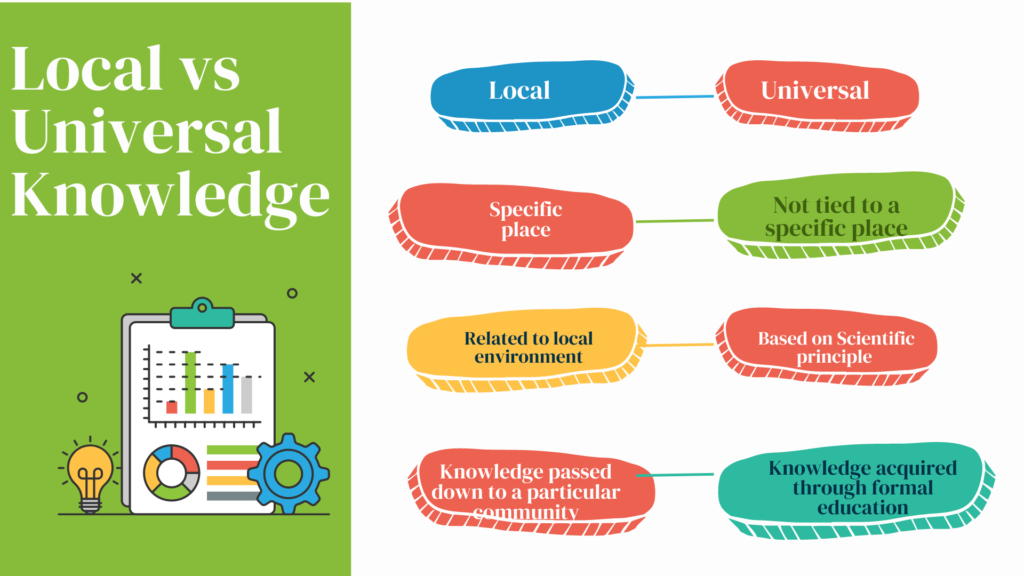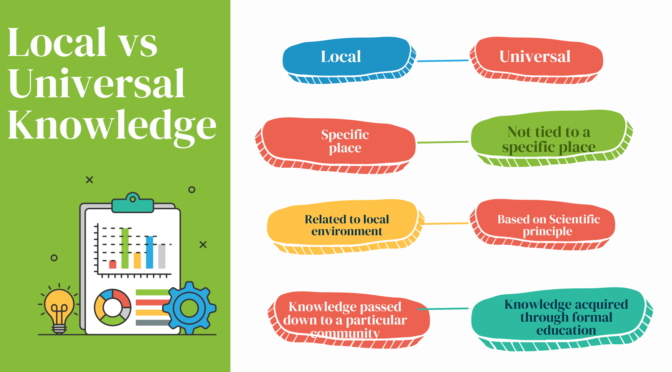Local knowledge is the knowledge that is specific to a particular place, region, or culture. Local Knowledge includes traditional practices, beliefs, values, customs, and ways of life that have been developed and passed down over time within a particular community. Local knowledge is mostly practical in nature and closely related to the local environment, including the natural and human-made systems that support life in that area.
Local knowledge is specific to a particular place or culture, while universal knowledge is recognized as having value and validity across different regions and cultures.
Universal knowledge refers to knowledge that is not tied to any particular place or culture and is recognized as having value and validity across different regions and cultures. Universal knowledge typically includes scientific principles, mathematical concepts, and other forms of knowledge that are considered to be true and unchanging regardless of where they are studied. Universal knowledge is the result of proper scientific and systematic study and research which is considered to be objective and impartial.
Universal knowledge is considered to be true, valid, and relevant in all cultures and communities. It is based on scientific principles and evidence which is considered to be applicable and relevant in all societies and cultures. Universal knowledge is often acquired through formal education and is validated through research and experimentation.
Also Read: Contextual and Textual Knowledge



GLOBAL BUSINESS ELITE YOUR WHOLESALE SUPPLIER OF AGRICULTURAL AND INDUSTRIAL COMMODITIES
We are a global company providing food, ingredients, agricultural solutions and industrial products that are vital for living. We connect farmers with markets so they can prosper. We connect customers with ingredients so they can make meals people love. And we connect families with daily essentials from eggs to edible oils, salt to skincare, feed to alternative fuel. https://globalbusinessltd.co.uk/
Global business elite
copper cathode
aluminium wire scrap
scrap processor
scrap cpus
waste paper scrap
fridge compressor scrap
cable scrap
scrap copper wire
waste paper for sale
ceramic cpu scrap
icumsa 100
cpu scrap
wholesale sugar suppliers uk
scrap processor
scrap central processing units
occ paper scrap
occ waste paper scrap
nut prosper globe
ocopper cathode specifications
sachet water filling and sealing machine
insulated copper wire scrap
waste paper supplier
recycled copper wire
copper scrap wire
occ waste paper suppliers in uk
processor gold recovery
waste paper supplier
ccopper wire scrap millberry
Some times its a pain in the ass to read what blog owners wrote but this web site is really user friendly! .
certainly like your web-site but you need to test the spelling on several of your posts. Several of them are rife with spelling problems and I to find it very bothersome to tell the truth however I will definitely come again again.
Este site é realmente fantástico. Sempre que acesso eu encontro coisas boas Você também pode acessar o nosso site e descobrir detalhes! informaçõesexclusivas. Venha descobrir mais agora! 🙂
me encantei com este site. Para saber mais detalhes acesse nosso site e descubra mais. Todas as informações contidas são informações relevantes e exclusivos. Tudo que você precisa saber está ta lá.